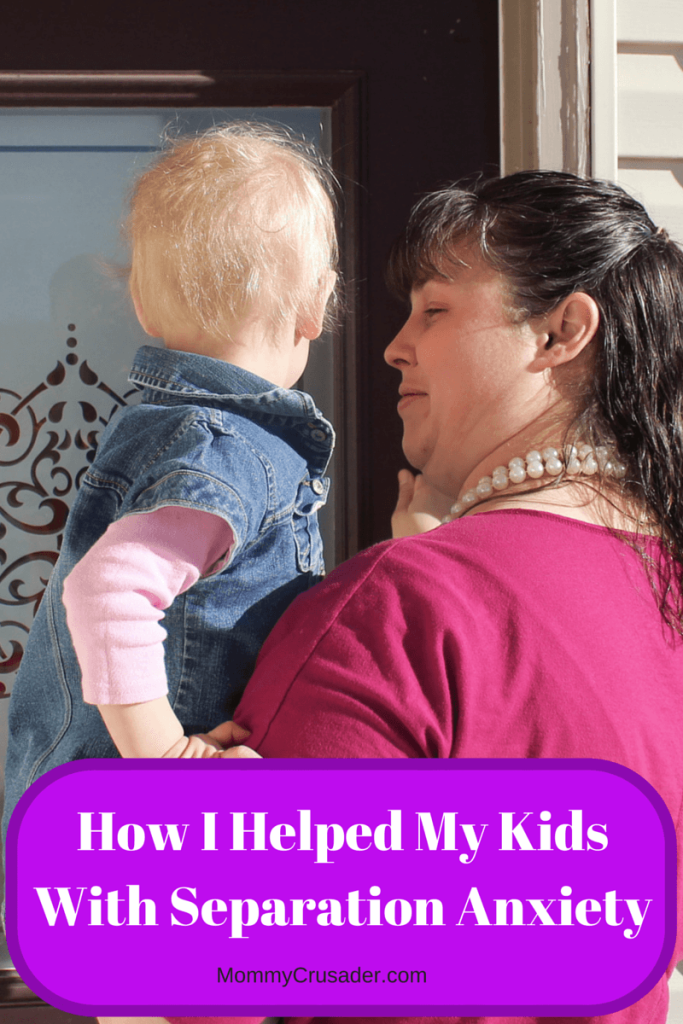Some sort of switch happens around 18 months. All of the sudden my baby who was happy to play with anyone, anywhere, is suddenly unable to bear the separation from mom or dad. The separation anxiety comes from the concept of object permanence developing in the baby’s mind, but the ensuing tears and anxiety often require some sort of plan to overcome. Here are some of the ways how I helped my kids with separation anxiety.
Trust the Caregiver
First, go into the situation with someone you trust. Trustworthy caregivers are going to take good care of the child. This will help parents as they leave the child with the caregiver. It’s important that both the parents and the caregiver are on the same page about expectations and goals for the child. Also, consistency is key during this time. Try to only have one or two caregivers because that way the child can build trust and expectations about the caregiver. Switching from one caregiver to another, to another confuses the child and creates unneeded stress.
Prepare the Child
It is helpful to prepare the child for the separation. I do this by going to the caregiver’s home, or business, and have a play date with my child and the new caregiver. If my child still seems unsure about the new caregiver, we’ll go on another playdate. Usually, though, after the first playdate, there are enough “new” things for my child to be excited about going back. And since I was there with the child initially, there is more of a familiarity and safety at the caregiver’s place than if my child is just dropped off somewhere new. I have found that preparing the child physically is more beneficial than just talking about what is going to happen.
Just Go
Finally, when it comes time to leave the child, then it is time to leave the child. Saying things like “I’ll see you soon” and reminding the child of all the fun things there are to do at the caregivers place can be helpful and of course giving the child a hug and a kiss is always good. But, saying “I have to go now” and then not going because the child is crying only reinforces the crying. As hard as it is, parents need to keep the promise of “I have to leave now” as much as they need to keep any promise they make to the child. Once the child understands that crying isn’t going to change the result of Mommy or Daddy leaving, then the crying will stop.
Having been on both the dropping off of children side of this equation, and the caregiver side – nothing is more upsetting to a child than a parent who says “I have to go,” but then comes back when he hears the child crying. It keeps me, as the caregiver, from helping the child transition. And it tells the child that crying will get the child what he wants which only makes the crying worse the next time the child is dropped off.
Reconnect
Once the child is reunited with the parents, it’s time to reconnect. I usually ask the child what he did during the day. I try to be very excited about whatever the child is excited about when I am reunited with my child. I try to answer all the questions my children have for me about my day. And I try to ask them meaningful questions about their day. In other words, when I get back I try to make sure that I tell my children how much I love them by giving them my attention. I wouldn’t recommend giving the child a treat or reward every time you are reunited. Save that for long trips or very special occasions. Instead, give the child your time for the first while when you are back.
I have found that by trusting the caregiver, preparing the children, just leaving, and reconnecting my children are better able to adjust to being with a caregiver other than myself or my husband. They understand that when I say I need to go that I need to go. They are in a familiar place with an adult who is someone Mommy trusts. And ultimately, they know that I’ll be back.



Permalink
Great tips! I think I have a harder time leaving my kids than they have leaving me.
Permalink
I feel the same way. They are generally super excited to be playing somewhere other than home.
Permalink
I think the just go tip is the best. It is hard to do as a parent, but you are right about making it more difficult in the long run.
Permalink
Thank you.
Permalink
The just go tip is so important. The kids will be fine, but if the slightest fuss or tears has the parent coming back over and over, the fussing and tears won’t stop. Parents who stay and return over “clingy” kids end up with the kids that don’t transition well. The children who transition the best in general are the ones whose parents set clear expectations and then leave. Returning on time and being consistent with the expectations also go a long way.
Permalink
Oh, thank you for adding the concept of consistency and expectations in the discussion. Those are key to the process of overcoming separation anxiety.